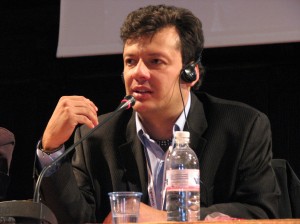Latin America, Democracy and Press Freedom

Hollman Morris
Guerilla warfare, drug trafficking and Governmental bribes are just some of the problems affecting free press coverage in Latin America according to Cecilia Rinalini from Rai Radio News. Mexico, she claims, has recently become the second most dangerous place for journalists to work since those who attempt to discuss drug trafficking can be assasinated if they fail to comply to advice from editors to “sweeten the truth.”
Rinaldini emphasises the centrality of television to Latin American news given that newpapers are not distribuited throughout many rural areas. She underlines the advantages of new independent television channels which allow for the propagation of ideas and opinions in small communities where people previously cannot relate to mainstream, business controlled television. Furthermore, she highlights the importance of local radio in countries such as Bolivia, where 70 percent of the population is indiginous, since televisions are expensive and newspapers require literacy.
According to Hollman Morris, director of Colombian television channel Contravia, free media is still seen as a nuisance by Governments throughout Latin America. Morris attribuites the scarcity of free media in Colombia to state opposition, illustrating the dangers that can arise from coverage of Guerilla warfare. He explains that Government accusations of collaboration with terrorist organisations are often followed by death threats from the public. He claims that illegal state phone tappings are common and stresses that the real threat for free media in Latin America lies in the “naming and shaming culture.”
Guido Piccoli, Correspondent of Italian daily Il Manifesto expresses concern regarding the potential negative ethical effects on media coverage of the new age of the blog. He claims that unlike North America, Latin America is lagging behind in the use of web communities and expresses the need for democratic online press that encourages the development of opinions rather than providing solely a means of communication among people. Piccoli warns of the dangers of exagerated media coverage on the fight against FARC (Revolutionary Armed Forces of Columbia) and advises journalists to avoid stereotypes that define countries in terms of terrorism. He denounces the laziness of internet news that deflects attention from the humanitarian and land ownership problems of Latin America.
